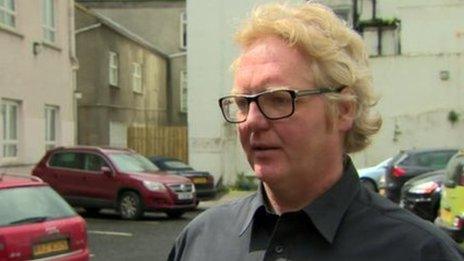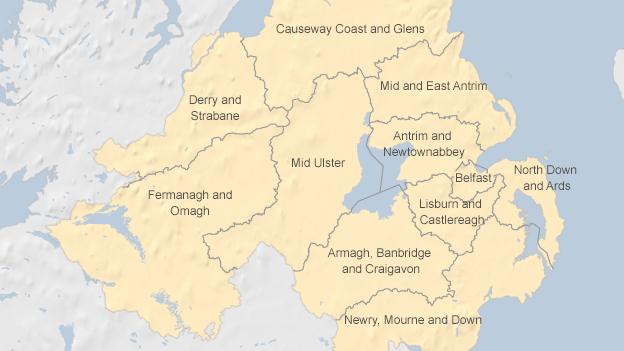Northern Ireland councils prepare to take planning plunge
- Published
Michael Corr said planning changes are a "huge opportunity for the future"
Northern Ireland's 11 new district councils are due to get a range of fresh powers when they take over local government from 1 April next year.
They range from extra responsibility for off-street parking, through to tourism.
Potentially, though, the most controversial move will be putting politicians in charge of all but the most significant planning decisions.
Councils will be able to accept or reject developments in their own areas.
Currently, if you want to build a new house or erect an extension, you have to apply for permission to the Planning Service, an agency that comes under the umbrella of Stormont's environment department.
Optimistic
Planning officials refer your application to your local council. The councillors can express their opinion on the merits of your application, but the final say rests with the Planning Service.
From April 2015 that responsibility will shift to the councils themselves, meaning elected politicians will make planning decisions.
So is this a positive move, democratising our planning system?
Michael Corr, the creative director of Northern Ireland's architecture and planning centre, PLACE, is optimistic.
Mr Corr already works with councils and government departments, providing advice on new developments like leisure centres.
He told me the move is "a huge opportunity for the future, which offers local councils an opportunity to develop their own community and development plans".
But do Northern Ireland's politicians have the necessary skills?
Speaking about voters, Mr Corr said: "They really want to choose politicians who have the ability and understand urban regeneration and planning issues, because it's those politicians who will be able to make the biggest difference."
Transparency needed
However, not everyone is so upbeat.
Back in the 1960s, local councils in Northern Ireland were accused of discrimination in the allocation of public housing.
Protests, like the one against Dungannon council's allocation of housing in County Tyrone, external, fuelled the Civil Rights movement.

James Orr, from Friends of the Earth, called for "good transparency" of planning decisions
The environmental group Friends of the Earth warn that a strict code of conduct will have to be rigorously enforced in order to ensure the new councils' handling of planning matters is regarded as fair and transparent.
James Orr, Northern Ireland director for Friends of the Earth, said: "In terms of property deals and in terms of politicking, we could see a situation not too far away from what happened in the 1960s, where certain communities get planning permission more favourably than other communities."
Mr Orr is also concerned about what he describes as a "tradition of close relationships between developers and political parties here".
He said: "It's quite easy to see that continuing, where we get a laissez-faire system which says, 'you look after your community and we won't bother engaging in proper democratic planning' . That is a real danger and that's why we need the nuts and bolts of good transparency put in place."
Donor secrecy
Friends of the Earth argue that giving politicians more powers with real financial consequences for developers and objectors makes it increasingly important that the public should know who donates to Northern Ireland's political parties.
Some local politicians remain opposed to the move, because they say it could deter donors worried about their personal security.
Others argue that the £7,500 limit for declaring donations is largely irrelevant to Northern Ireland, as the Stormont parties don't attract such large amounts.
Under the terms of a law passed earlier this year, external, it's up to the Northern Ireland Secretary to decide when the time is right to make an order shedding more light on political donations.
- Published13 December 2013
